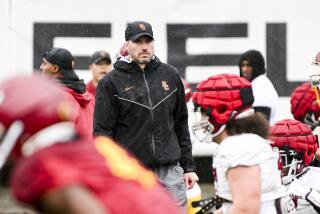Collins Has Bat, Will Travel--Fast : Tiger Speedster Has Played in 7 Different Cities in 11 Years
Growing up in Rapid City, S.D., doesn’t exactly provide a youngster with a wealth of chances to hone in on the intricacies of baseball. The weather barely allows a kid enough time on the diamond to get the three-strikes-and-you’re-out part down.
In that part of the country, you have to wear two gloves most of the year just to survive.
In fact, the weather was so bad that the Rapid City high school Dave Collins attended didn’t even bother to field a baseball team.
All of which did not deter Collins, of course, or his father, who had some ideas about helping his son improve in a game that the good folks of Rapid City seldom refer to as the national pastime.
“I can’t even remember which way I hit naturally, but I remember my dad always made me hit from both sides . . . from the first day he tossed me a ball,” Collins said.
“I can remember him turning me around and saying, ‘It’s always to a hitter’s advantage if he can switch-hit.’ ”
Chalk another one up in the Father Knows Best category.
Collins, an 11-year major league veteran plying his trade in the outfield for the Detroit Tigers, is off to a vintage start in 1986. He went into Wednesday night’s game against the Angels hitting .319. That’s .319 as a left-handed hitter and .318 from the right side.
Speed--he ran a 9.6 100-yard dash in high school--has always been a Dave Collins trademark, but he’s not just another rabbit that some minor league batting instructor tried to teach to beat the ball into the ground from both sides of the plate.
“I’m not a pure hitter like some of the guys in this league,” he said, “but I’ve been a switch-hitter all my life and I work on it all the time.”
The work ethic began paying off 11 years ago, when the 22-year-old rookie outfielder arrived in Anaheim Stadium after three seasons in the Angels’ minor league system.
“Yeah, I have special feelings for this park,” Collins said Wednesday. “It was my first experience in the big leagues, my first appearance as a major leaguer.”
His first big-league hit was a drag bunt, setting the tone for his entire career.
“Speed has been my bread and butter,” said Collins, who stole 79 bases in 1980 with Cincinnati. “But I also think I’ve become a better hitter along the way.”
Frank Tanana, now Collins’ teammate with the Tigers, will go along with that. He can’t remember anyone in an Angels uniform who could hit in 1975. That was the season Tanana led the majors in strikeouts (269), had a 2.63 earned-run average and felt like he should have ended up better than 16-9.
“We had a young team with a lot of speedsters like Davey,” Tanana recalled. “We could run, but you can’t steal first base. And we couldn’t hit a sacrifice fly to save ourselves.”
Collins insists that he’s as quick afoot as he ever was, but there’s no debate about his seasoning as a hitter.
“Davey’s a talented man who has added the consistency we’ve really needed,” Tiger Coach Vada Pinson said. “He’s a student of the game who has that knack of getting on base. He’s got quick hands at the plate and I love it when he’s in there ‘cause I know he’ll make things happen.”
On Wednesday night, Collins had a single and a stolen base in Detroit’s 4-1 victory over the Angels. Last year, he hit .308 with two homers and nine RBIs against the Angels, who drafted him in 1972.
After two years with the Angels, Collins was selected by Seattle in the 1976 expansion draft. The next year, he was traded to Cincinnati and that’s when he really started to make things happen. In four years with the Reds, he averaged .294, including a career-high .318 in ’79.
After taking the Reds to salary arbitration twice, Collins became a free agent in 1981. When Cincinnati chose not to re-draft him, he ended up in Yankee pinstripes with an $800,000-a-year contract . . . and a frown on his face.
“I hated to leave,” he said. “I came into my own as an everyday player in Cincinnati. Four years was the longest I’ve ever been on one club and ’79 was the closest I’ve ever come to winning it all.”
To make matters worse, Collins had a little problem with the Yankee front office, which he felt wasn’t being very up front.
“They told me one thing . . . that I’d be leading off a lot, DH-ing, playing the outfield and some first base,” he said, “but come spring training I was nowhere.
“The first thing I learned in New York was to expect the unexpected.”
Less than a year later, though, Collins was included in a multiplayer deal with Toronto and his career was revived. He hit .308 in 1984 and stole 60 bases. The Blue Jays--if it hadn’t been for the Tigers--would have won their first pennant.
But the Jays felt that they were one relief pitcher short of the World Series and they traded Collins and shortstop Alfredo Griffin for Bill Caudill. The Collins happiness meter was dropping off the bottom of the scale again.
“I was pretty frustrated,” he recalled. “I was with a team (Toronto) that was peaking and then I had to make another change and start over. And my stay in Oakland didn’t work out for me.”
Last winter, the A’s decided to clear out all the competition for rookie sensation Jose Canseco, and Tiger Manager Sparky Anderson was more than ready to accommodate.
“We were very happy to get him,” Anderson said, winking. “He didn’t play much for me in Cincinnati (in 1978), but we knew we had a guy who could fly. And he can still run.”
The Tigers aren’t going to remind anyone of the 1975 Angels. Collins leads the team with seven steals. But he’s played in 36 of Detroit’s 41 games, so he’s not complaining.
“I’ve had a good start, but there’s a long way to go,” Collins said. “At the end of the year, I’ll judge it by how we do and how I do. I’m getting a chance and that’s all a player can ask.”
And, thanks to dad, at least he doesn’t have to worry about being platooned.
More to Read
Go beyond the scoreboard
Get the latest on L.A.'s teams in the daily Sports Report newsletter.
You may occasionally receive promotional content from the Los Angeles Times.





